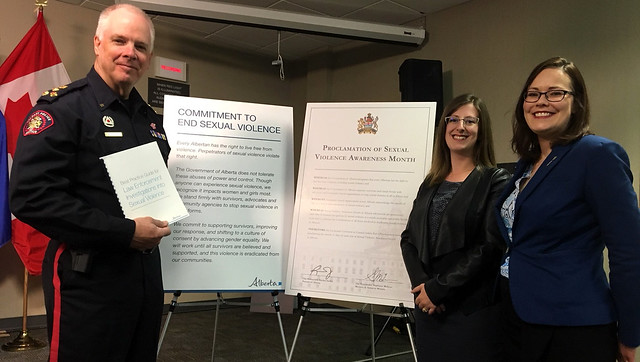This release was issued under a previous government.

L-R: Chief Roger Chaffin, Calgary Police Service, Minister McLean and Minister Ganley announce a new initiative to assist law enforcement agencies investigating sexual violence.
The guide, released by Alberta Justice and Solicitor General, provides police officers with up-to-date information about sexual violence. This new tool outlines investigative procedures that will lead to more reliable evidence-gathering, while respecting the effect that trauma can have on a survivor’s physical, psychological and emotional well-being.
“The decision to report sexual violence is deeply personal and can be extremely difficult. Only a fraction of sexual assaults come to the attention of the criminal justice system each year. We hope these guidelines will give more survivors confidence that they will be treated with dignity and respect if they decide to come forward to police.”
This initiative supports one of the main pillars of the Government of Alberta’s commitment to end sexual violence by working to improve the institutional response for survivors.
The guide emphasizes a “trauma-informed approach” to cases of sexual assault while dispelling common myths and stereotypes, and providing a clear, consistent and comprehensive framework for police when conducting interviews and collecting evidence.
“The effect that trauma has on how victims report sexual violence is understood much better today than it was even a decade ago. This new best practice guide will give all police agencies a common understanding of how our approach to these investigations should be evolving to better serve victims and the community. I would like to thank the committee who worked tirelessly to research and examine the issue to develop this comprehensive document.”
It also ensures survivors receive appropriate followup support from Victim Service Units and other sources of medical and emotional care, even if the survivor has decided not to pursue a criminal complaint.
“Myths and stereotypes about sexual assault prevent survivors from reporting to police. These guidelines will help to ensure that survivors who make the difficult decision to report will receive a fair, sensitive and compassionate first response.”
Quick facts
- The best practice guide is ready for use by Alberta police services in their training and has been endorsed by the Alberta Association of Chiefs of Police.
- The manual was developed by the Sexual Violence Police Advisory Committee (SVPAC), a group formed by Alberta Justice and Solicitor General (JSG) in 2015 to improve institutional responses to sexual violence.
- The committee has representatives from the Government of Alberta (JSG, Community and Social Services, Status of Women), law enforcement, Alberta Health Services and the Alberta Association of Sexual Assault Services.
- The SVPAC continues to meet monthly, which will help ensure the information in the guide remains current and accurate.
- The SVPAC is also developing a sexual violence training curriculum for law enforcement in Alberta. The curriculum will focus on the trauma-informed approach that’s emphasized in the best practice guide and will be designed so police can incorporate it into existing training for recruits, patrol officers and specialized investigators.
- Every Albertan has the right to live free from violence, and perpetrators of sexual violence violate that right. This action is part of Alberta’s commitment to end sexual violence, a government-wide approach to support survivors, improve our response and shift to a culture of consent by advancing gender equity. More information about the commitment can be found online.